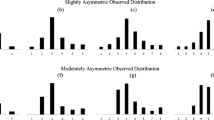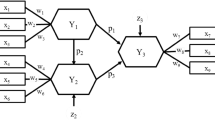Abstract
This work exploits links between Data Envelopment Analysis (DEA) and multicriteria decision analysis (MCDA), with decision making units (DMUs) playing the role of decision alternatives. A novel perspective is suggested on the use of the additive DEA model in order to overcome some of its shortcomings, using concepts from multiattribute utility models with imprecise information. The underlying idea is to convert input and output factors into utility functions that are aggregated using a weighted sum (additive model of multiattribute utility theory), and then let each DMU choose the weights associated with these functions that minimize the difference of utility to the best DMU. The resulting additive DEA model with oriented projections has a clear rationale for its efficiency measures, and allows meaningful introduction of constraints on factor weights.





Similar content being viewed by others
References
Ali AI, Lerme CS and Seiford L (1995). Components of efficiency evaluation in data envelopment analysis. Eur J Opl Res 80: 462–473.
Athanassopoulos AD and Podinovski VV (1997). Dominance and potential optimality multiple criteria models decision analysis with imprecise information. J Opl Res Soc 48: 142–150.
Banker RD, Charnes A and Cooper WW (1984). Some models estimating technical and scale inefficiencies in data envelopment analysis. Mngt Sci 30: 1078–1092.
Bouyssou D (1999). Using DEA as a tool for MCDM: Some remarks. J Opl Res Soc 50: 974–978.
Charnes A, Cooper WW and Rhodes E (1978). Measuring the efficiency of decision making units. Eur J Opl Res 2: 429–444.
Charnes A, Cooper WW, Golany B, Seiford L and Stutz J (1985). Foundations of data envelopment analysis for Pareto–Koopmans efficient empirical production functions. J Econom 30: 91–107.
Dias LC and Clímaco JN (2000). Additive aggregation with variable interdependent parameters: The VIP analysis software. J Opl Res Soc 51: 1070–1082.
Doyle J and Green R (1993). Data envelopment analysis and multiple criteria decision making. Omega 21: 713–715.
Goodwin P and Wright G (1998). Decision Analysis for Management Judgement. Wiley: Chichester.
Halme M, Joro T, Korhonen P, Salo SE and Wallenius J (1999). A value efficiency approach to incorporating preference information in data envelopment analysis. Mngt Sci 45: 103–115.
Joro T, Korhonen P and Wallenius J (1998). Structural comparison of data envelopment analysis and multiple objective linear programming. Mngt Sci 44: 962–970.
Keeney RL and Raiffa H (1976). Decisions with Multiple Objectives: Preferences and Value Trade-off. Wiley: New York.
Miettinen K and Salminen P (1999). Decision-aid for discrete multiple criteria decision making problems with imprecise information data. Eur J Opl Res 119: 50–60.
Salo AA and Hämäläinen RP (2001). Preference relations in multiattribute evaluation (PRIME)—elicitation and decision procedures under incomplete information. IEEE Trans Syst Man Cybernet A 31: 533–545.
Stewart TJ (1996). Relationships between data envelopment analysis and multiple criteria decision analysis. J Opl Res Soc 47: 654–665.
von Winterfeldt D and Edwards W (1986). Decision Analysis and Behavioural Research. Cambridge University Press: New York.
Acknowledgements
The authors wish to thank the remarks of an anonymous referee. This research was partially supported by FCT/FEDER Grants POSI/SRI/37346/2001 and POCI/EGE/58371/2004.
Author information
Authors and Affiliations
Corresponding author
Rights and permissions
About this article
Cite this article
Gouveia, M., Dias, L. & Antunes, C. Additive DEA based on MCDA with imprecise information. J Oper Res Soc 59, 54–63 (2008). https://doi.org/10.1057/palgrave.jors.2602317
Received:
Accepted:
Published:
Issue Date:
DOI: https://doi.org/10.1057/palgrave.jors.2602317




